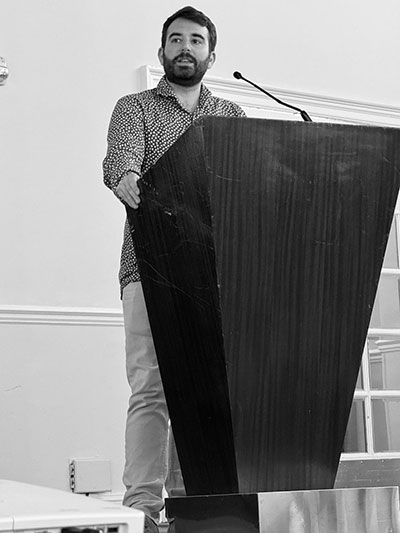UW Math and Statistics Professor Wins Award for Novel Cancer Treatment Therapy Proposal
Published November 25, 2025

Konstantinos Mamis, a UW assistant professor of mathematics and statistics, presents at the 13th Annual Integrated Mathematical Oncology Workshop at Moffitt Cancer Center in Tampa, Fla. Mamis was part of a team that won an award for a novel cancer treatment therapy proposal. (Moffitt Cancer Center Integrated Mathematical Oncology Department Photo)
Konstantinos Mamis, an assistant professor in the University of Wyoming Department
of Mathematics and Statistics, was part of a team that won the 13th Integrated Mathematical
Oncology (IMO) Workshop at the Moffitt Cancer Center in Tampa, Fla.
The annual, highly interdisciplinary event brings together clinicians, experimentalists
and mathematical modelers for four and a half intensive days of collaboration focused
on a specific cancer-related theme. The theme of this year’s workshop Nov. 2-7 was “Revolution
in Cancer Therapies.”
The winning proposal submitted by Mamis’ team was titled “Restoring Balance: AI-assisted
rapid mathematical model development for restoration ecology-guided CAR-T therapy.”
It calls for a novel mathematical modeling framework inspired by restoration ecology
principles to optimize chimeric antigen receptor (CAR) T-cell therapy for cancer treatment.
CAR T-cell therapy treats some types of blood cancer by introducing a lab-made gene
to cancer-fighting T cells to help them detect and kill cancerous cells.
“CAR T-cell therapy has transformed treatment for blood-based tumors but faces significant
challenges due to the complex interactions within the immune system/tumor microenvironment,”
Mamis says.
To overcome those challenges, Mamis’ team members worked across their respective disciplines
to combine approaches from AI-assisted modeling, restoration ecology and rapid prototyping.
Mamis specifically contributed to the mathematical modeling aspect of the project,
focusing on developing hierarchical models for blood cell generation.
According to Mamis, the team’s approach could revolutionize treatment for certain
types of blood cancers. That approach calls upon principles from restoration ecology,
which emphasize that balance in an environment requires both biotic interventions
-- introducing species -- and abiotic interventions, or modifying the environment.
“So far, CAR-T therapy has been purely biotic -- we inject engineered T cells. Our
approach adds an abiotic component: modifying the immune environment through lymphodepletion
and related strategies to create conditions that allow CAR-T cells to function more
effectively,” Mamis says.
To ensure this promising methodology can reach its full potential, the award includes
a $50,000 pilot grant to further develop the team’s model through data-based validation,
targeted experiments and clinical applications. Mamis will continue to collaborate
closely with the experimentalists on his team to integrate clinical and experimental
data into its models to ensure their accuracy.
“If successful, this work will provide a new paradigm for immunotherapy design; enable
faster model development for personalized treatment strategies; and bridge ecological
theory with oncology to foster interdisciplinary innovation,” he says.
Teams at the IMO are decided by the workshop organizers. That meant Mamis was unfamiliar
with his new colleagues before collaborating with them on the workshop proposal. The
14 members of Mamis’ team ranged from Ph.D. students to assistant professors and research
associates in a variety of disciplines and from locations across the world.
The IMO workshops at Moffitt Cancer Center have been held annually for 13 years with
precisely this type of interdisciplinary synergy in mind. The stated goals of the
organizers are to think outside the box, take risks and “go against the status quo
to come up with the most innovative approaches to treating cancer.”
At the end of the workshop, the best project proposal is selected based on the importance
of the question addressed by the team; the originality of the approach; the degree
of success in developing and applying the model; the quality of the team’s presentation;
and the degree of integration across disciplines.
“The workshop was a fantastic opportunity to engage in team science and translational
modeling at the interface of mathematics and oncology and also establish my collaborations
with researchers from the Integrated Mathematical Oncology Department of Moffitt Cancer
Center,” Mamis says.
For more information about IMO workshops, go to www.imoworkshop.org/about.html.

